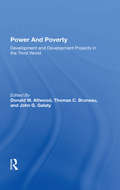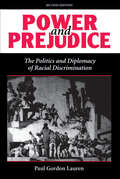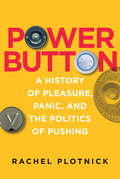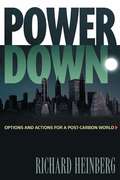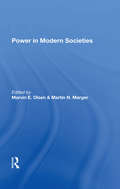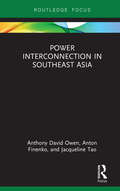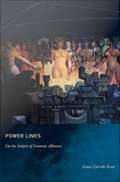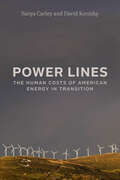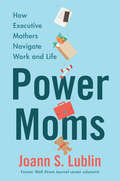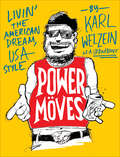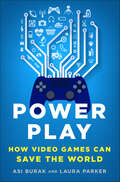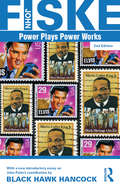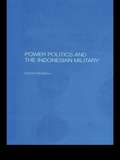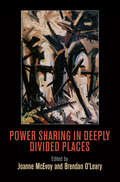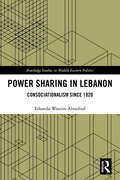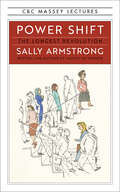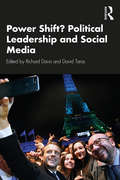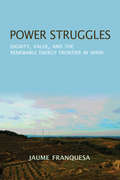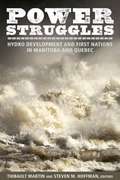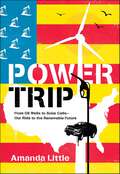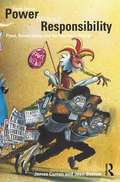- Table View
- List View
Powder Wars: The Supergrass who Brought Down Britain's Biggest Drug Dealers
by Graham JohnsonGangster Paul Grimes was a one-man crimewave with a breathtaking capacity to steal. Any villains who got in his way were made to pay - often with their blood. But when his son died of a drugs overdose, the old-school mobster swore revenge on the new generation of Liverpool-based heroin and cocaine dealers. Against all odds, he turned undercover informant. The first gangster to fall foul of Grimes' change of heart was Curtis Warren, aka 'Cocky', the wealthiest and most successful criminal in British history. Grimes infiltrated his cocaine cartel and led Customs to the largest narcotics seizure on record, putting Warren in the dock in the drugs trial of the twentieth century. After turning his attention to heroin baron John Haase, Grimes rose to become the boss of the villain's notoriously bloodthirsty 'security firm' - a professional gang of racketeers addicted to cocaine, explosive violence and non-stop criminality. But as his net began to tighten, Grimes was confronted with the ultimate dilemma. He discovered his second son was now a rising star in the drugs business. The life-or-death question was: should he shop him or not?Powder Wars also reveals the secrets behind one of the most controversial episodes in British judicial history - how former Home Secretary Michael Howard was duped into granting John Haase a Royal Pardon.Today, Paul Grimes has a £100,000 contract on his head and is a real-life dead man walking. Powder Wars is a riveting account of modern gangsters told in brutal detail.
Power And Poverty: Development And Development Projects In The Third World
by John G Galaty Donald W. Attwood D W Attwood Thomas C BruneauThis book presents case studies concerning the impact of development projects on societies at various levels of affluence and modernization. They demonstrate project variety, and the ecological, economic, political and social contexts within which development is attempted but seldom achieved.
Power And Prejudice: The Politics And Diplomacy Of Racial Discrimination, Second Edition
by Paul Gordon LaurenSince it first appeared, Power and Prejudice has been hailed as a bold, pioneering work dealing with one of the central and most controversial issues of our time?the relationship between racial prejudice and global conflict. Powerfully written and based on documents from archives on several continents, this award-winning book convincingly demonstrates that the racial issue, or what W.E.B. Du Bois called ?the problem of the twentieth century,? has profoundly influenced most major developments in international politics and diplomacy.Lauren begins with a thought-provoking discussion of the heavy burden of history's pattern of conquest and slavery wherin skin color identified master and slave, conqueror and conquered. He then examines bitter twentieth-century conflicts over race, including immigration exclusion and the ?Yellow Peril,? the ?Final Solution? of the Holocaust, decolonization, the impact of the Cold War on the civil rights movement, and the global struggle against racial prejudice. In this new edition, Lauren adds dimensions about Asia, Latin America, and the Pacific, exploring the racial dimensions of immigration exclusion and warfare. He contributes significant new material about international issues regarding indigenous peoples around the world, including self-determination, sovereignty, and discrimination. And finally, he examines the dramatic events surrounding the end of apartheid in South Africa.Eloquent, provocative, and informed by first-rate scholarship, the insights of this highly original work will appeal to general readers as well as to students and scholars from a broad range of disciplines.
Power Button: A History of Pleasure, Panic, and the Politics of Pushing
by Rachel PlotnickPush a button and turn on the television; tap a button and get a ride; click a button and “like” something. The touch of a finger can set an appliance, a car, or a system in motion, even if the user doesn't understand the underlying mechanisms or algorithms. How did buttons become so ubiquitous? Why do people love them, loathe them, and fear them? In Power Button, Rachel Plotnick traces the origins of today's push-button society by examining how buttons have been made, distributed, used, rejected, and refashioned throughout history. Focusing on the period between 1880 and 1925, when “technologies of the hand” proliferated (including typewriters, telegraphs, and fingerprinting), Plotnick describes the ways that button pushing became a means for digital command, which promised effortless, discreet, and fool-proof control. Emphasizing the doubly digital nature of button pushing—as an act of the finger and a binary activity (on/off, up/down)—Plotnick suggests that the tenets of precomputational digital command anticipate contemporary ideas of computer users. Plotnick discusses the uses of early push buttons to call servants, and the growing tensions between those who work with their hands and those who command with their fingers; automation as “automagic,” enabling command at a distance; instant gratification, and the victory of light over darkness; and early twentieth-century imaginings of a future push-button culture. Push buttons, Plotnick tells us, have demonstrated remarkable staying power, despite efforts to cast button pushers as lazy, privileged, and even dangerous.
Power Down: Options and Actions for a Post-Carbon World
by Richard HeinbergIf the US continues with its current policies, the next decades will be marked by war, economic collapse, and environmental catastrophe. Resource depletion and population pressures are about to catch up with us, and no one is prepared. The political elites, especially in the US, are incapable of dealing with the situation and have in mind a punishing game of "Last One Standing." The alternative is "Powerdown," a strategy that will require tremendous effort and economic sacrifice in order to reduce per-capita resource usage in wealthy countries, develop alternative energy sources, distribute resources more equitably, and reduce the human population humanely but systematically over time. While civil society organizations push for a mild version of this, the vast majority of the world's people are in the dark, not understanding the challenges ahead, nor the options realistically available. Powerdown speaks frankly to these dilemmas. Avoiding cynicism and despair, it begins with an overview of the likely impacts of oil and natural gas depletion and then outlines four options for industrial societies during the next decades: Last One Standing: the path of competition for remaining resources; Powerdown: the path of cooperation, conservation and sharing; Waiting for a Magic Elixir: wishful thinking, false hopes, and denial; Building Lifeboats: the path of community solidarity and preservation. Finally, the book explores how three important groups within global society-the power elites, the opposition to the elites (the antiwar and antiglobalization movements, et al: the "Other Superpower"), and ordinary people-are likely to respond to these four options. Timely, accessible and eloquent, Powerdown is crucial reading for our times. Richard Heinberg is an award-winning author of five previous books, including The Party's Over: Oil, War and the Fate of Industrial Societies.
Power In Modern Societies
by Marvin E. Olsen Martin N Marger Valencia FonsecaAn extensively revised and updated new edition of Olsen’s Power in Societies, this book contains carefully selected and edited writings on the exercise of social power in contemporary societies. The essays cover four broad topics: power in social organization, theoretical perspectives on power, national power structures, and power and the state. Ea
Power Interconnection in Southeast Asia (Routledge Contemporary Southeast Asia Series)
by Anthony David Owen Anton Finenko Jacqueline TaoProviding an analysis of multilateral power markets, this book examines power interconnection in Southeast Asia, especially among the ASEAN countries. It uses evolutionary experience of electricity interconnection and trade in three international markets that have relevance for ASEAN to draw upon common global themes. Specifically, it compares the Southern African Power Pool, the European grid, and Nord Pool. Discussing the progress made among ASEAN countries in regional energy integration, with a particular focus on the Greater Mekong Sub-region interconnection, it also examines the recently announced interconnection concept between Lao People’s Democratic Republic, Thailand, Malaysia, and Singapore. Exploring the challenges facing ASEAN interconnection of power grids in the context of previous experience elsewhere in the world, this book presents a template for appropriate best practice in terms of technical, political, and financial requirements. It will therefore be of value to decision makers interested in the political economy of energy in Southeast Asia, as well as academics working on Energy Politics and Southeast Asian Politics.
Power Lines: On the Subject of Feminist Alliances
by Aimee Carrillo RoweLike the complex systems of man-made power lines that transmit electricity and connect people and places, feminist alliances are elaborate networks that have the potential to provide access to institutional power and to transform relations. In Power Lines, Aimee Carrillo Rowe explores the formation and transformative possibilities of transracial feminist alliances. She draws on her conversations with twenty-eight self-defined academic feminists, who reflect on their academic careers, alliances, feminist struggles, and identifications. Based on those conversations and her own experiences as an Anglo-Chicana queer feminist researcher, Carrillo Rowe investigates when and under what conditions transracial feminist alliances in academia work or fail, and how close attention to their formation provides the theoretical and political groundwork for a collective vision of subjectivity. Combining theory, criticism, and narrative nonfiction, Carrillo Rowe develops a politics of relation that encourages the formation of feminist alliances across racial and other boundaries within academia. Such a politics of relation is founded on her belief that our subjectivities emerge in community; our affective investments inform and even create our political investments. Thus experience, consciousness, and agency must be understood as coalitional rather than individual endeavors. Carrillo Rowe's conversations with academic feminists reveal that women who restrict their primary allies to women of their same race tend to have limited notions of feminism, whereas women who build transracial alliances cultivate more nuanced, intersectional, and politically transformative feminisms. For Carrillo Rowe, the institutionalization of feminism is not so much an achievement as an ongoing relational process. In Power Lines, she offers a set of critical, practical, and theoretical tools for building and maintaining transracial feminist alliances.
Power Lines: Phoenix and the Making of the Modern Southwest (Politics and Society in Modern America #107)
by Andrew NeedhamHow high energy consumption transformed postwar Phoenix and deepened inequalities in the American SouthwestIn 1940, Phoenix was a small, agricultural city of sixty-five thousand, and the Navajo Reservation was an open landscape of scattered sheepherders. Forty years later, Phoenix had blossomed into a metropolis of 1.5 million people and the territory of the Navajo Nation was home to two of the largest strip mines in the world. Five coal-burning power plants surrounded the reservation, generating electricity for export to Phoenix, Los Angeles, and other cities. Exploring the postwar developments of these two very different landscapes, Power Lines tells the story of the far-reaching environmental and social inequalities of metropolitan growth, and the roots of the contemporary coal-fueled climate change crisis.Andrew Needham explains how inexpensive electricity became a requirement for modern life in Phoenix—driving assembly lines and cooling the oppressive heat. Navajo officials initially hoped energy development would improve their lands too, but as ash piles marked their landscape, air pollution filled the skies, and almost half of Navajo households remained without electricity, many Navajos came to view power lines as a sign of their subordination in the Southwest. Drawing together urban, environmental, and American Indian history, Needham demonstrates how power lines created unequal connections between distant landscapes and how environmental changes associated with suburbanization reached far beyond the metropolitan frontier. Needham also offers a new account of postwar inequality, arguing that residents of the metropolitan periphery suffered similar patterns of marginalization as those faced in America's inner cities.Telling how coal from Indian lands became the fuel of modernity in the Southwest, Power Lines explores the dramatic effects that this energy system has had on the people and environment of the region.
Power Lines: The Human Costs of American Energy in Transition
by Sanya Carley David KoniskyOn American energy and its persisting power to destroy. In the United States, the promise of a green-energy future is complicated by its realities. The country’s legacy energy systems are decrepit; the rollout of new technologies is unequal and piecemeal; households find themselves increasingly without reliable or affordable access; and Americans are excluded from the decisions that shape their energy futures. Having power in America has become an exercise in race, class, and wealth—in more ways than one. Power Lines is a sweeping portrait of American energy in the twenty-first century, rendered in terms of its increasing—and inevitable—human costs. Coal miners in West Virginia lose their livelihoods as energy markets change; historically marginalized households cannot easily access new technologies; children in “sacrifice zones” adjacent to mineral-mining sites suffer health problems and limited resources; and cities and towns are burdened from the production of alternative energies. Sanya Carley and David Konisky show current challenges and an uncertain future of America’s greatest policy imperative. The result is not only sobering but also essential for planning and pursuing a clean-energy transition that improves on the errors of the past.
Power Moms: How Executive Mothers Navigate Work and Life
by Joann S. LublinA retired Wall Street Journal editor and mother compares two generations of women—boomers and GenXers—to examine how each navigates the emotional and professional challenges involved in juggling managerial careers and families.For the first time in American history, a significant number of mothers are heading major corporations, including General Motors, Ulta Beauty, and Best Buy. Over the past several decades, women have made gains throughout executive suites. Yet these “Power Moms” still struggle with balancing their management responsibilities with raising children. Joann S. Lublin draws on the experiences of the nation’s two generations of these successful women to measure how far we’ve come—and how far we still need to go.Lublin combines her own insights with those of eighty-five executive mothers across industries—including experienced public-company chiefs such as Carol Bartz, the first woman to command Autodesk and Yahoo; Hershey’s Michele Buck, DuPont’s Ellen Kullman, ITT’s Denise Ramos, and WW International’s Mindy Grossman—and twenty-five of their grown daughters. Lublin reveals how trailblazer boomers, many now in their sixties, often endured sweeping disapproval for their demanding management careers, even as their own daughters sometimes rejected their choices. While the second wave of executive mothers—all under forty-five—handle working parenthood with less angst, they still lead stressful lives. Power Moms provides lessons and advice to help today’s professional women, their families, and their employers navigate this challenging terrain. Lublin looks at the trade-offs mothers are too often forced to make between work and family and the root causes, including the dearth of large-scale paid parental leave and other family-friendly policies. While it celebrates the gains women have made, Power Moms makes clear how much more must be done to make being a working mother easier.
Power Moves: A Guide to Livin' the American Dream, USA Style
by Karl WelzeinMeet Karl Welzein, aka Captain Karl, aka @DadBoner on Twitter—the Midwest's most beautiful loserKarl Welzein is really lookin' forward to the weekend, you guys.His job is a drag and his wife kicked him out, but that's okay. She wears granny panties and is constantly dropping wads of cash at Target, and his son cries all the time. Now his "temporary" roommate, Dave, ate all the Totino's pizza rolls. Again. Karl Welzein is sick of this. So sick of this.Power Moves chronicles the hilarious decline of Karl Welzein on his journey from life as a Dockers-and-golfshirt-wearing dad to a ponytailed party maniac who spits out his life philosophies like a modern-day Charles Bukowski (if he preferred to get drunk at Applebee's).A middle-aged Michigan native, Karl may be overweight, prone to questionable fashion and culinary choices, oblivious to his drinking problem, a poor excuse for an employee, obsessed with the restroom, and a terrible husband, father, and friend . . . but in his heart he means well. He's just like a lot of us—he loves the USA, Guy Fieri, bold flavors, Bob Seger, and thinking he looks jacked in a tight tee and Maui Jim sunglasses. Karl is an everyman and like no other man on the planet all at once.Inspired by the Twitter feed @DadBoner, Karl finally tells his full story. He shares his wisdom on fitness (1. Look at a pic of Stone Cold Steve Austin. 2. Do 'shups 'til you look like Stone Cold. 3. Cut off your sleeves), diet (Eat only the filling of the Taco Bell Beefy Melts for maximum flavor and low-carb health), fashion (Wearin' boots with jean shorts says "I like to keep cool, but I'm ready if the action gets hot"), work life (If you don't have a job that makes you want to kill yourself, you don't deserve to drink until you want to die), and the bliss of the perfect weekend (beers, brats, and babes' chest beefers).But above all, this is a story about America—the real red, white, and blue America of today. Welcome to Karl's world. Reading this book is the ultimate Power Move.
Power Play: How Video Games Can Save the World
by Laura Parker Asi Burak“An insider’s view of the good things that can emerge from being glued to a screen. . . . A solid piece of pop-culture/business journalism.” —Kirkus ReviewsThe phenomenal growth of gaming has inspired plenty of hand-wringing since its inception—from the press, politicians, parents, and everyone else concerned with its effect on our brains, bodies, and hearts. But what if games could be good, not only for individuals but for the world? In Power Play, Asi Burak and Laura Parker explore how video games are now pioneering innovative social change around the world.As the former executive director and now chairman of Games for Change, Asi Burak has spent the last ten years supporting and promoting the use of video games for social good, in collaboration with leading organizations like the White House, NASA, World Bank, and The United Nations. The games for change movement has introduced millions of players to meaningful experiences around everything from the Israeli-Palestinian conflict to the US Constitution.Power Play looks to the future of games as a global movement. Asi Burak and Laura Parker profile the luminaries behind some of the movement’s most iconic games, including former Supreme Court judge Sandra Day O’Connor and Pulitzer Prize–winning authors Nicholas Kristof and Sheryl WuDunn. They also explore the promise of virtual reality to address social and political issues with unprecedented immersion, and see what the next generation of game makers have in store for the future.
Power Players: Sports, Politics, and the American Presidency
by Chris CillizzaA colorful look at how modern presidents play sports, have used sports to play politics, and what our fan-in-chief can often tell us about our national pastimes. POWER PLAYERS tells all the great stories of presidents and the sports they played, loved and spectated as a way to better understand what it takes to be elected to lead a country driven by sports fans of all stripes. While every modern president has used sports to relate to Joe Q. Public, POWER PLAYERS turns the lens around to examine how sports have shaped our presidents and made for some amazing moments in White House history, including: Dwight Eisenhower played so much golf he had a putting green built outside the Oval Office!. (He also almost died on a golf course while in office.) How John F. Kennedy&’s touch-football games with family were knowing plays to polish the Camelot mystique. People might not have related to the aloof and awkward Richard Nixon but, hey, he would bowl a few frames just like them. Ronald Reagan didn&’t just play the part of &“The Gipper&” for the silver screen, but truly adopted the famous footballer&’s never-say-die persona. George H.W. Bush once ran a horseshoe league from the White House – with a commissioner and brackets! (He would later claim to have come up with the fan expression, &“You da man.&”) Bill Clinton&’s Arkansas Razorback fandom was so intense that he could be found shouting at the referees from a box at the basketball national championship game in 1994. George W. Bush&’s not only owned the Texas Rangers but also threw out the most iconic first pitch ever in the 2001 World Series. What really went down when Barack Obama played pickup hoops with the North Carolina Tarheels. (He later won the state by .3 percent of the vote.) Donald Trump is the only president ever featured in a professional wrestling storyline—and everything real and fake that went with that. In the pages of POWER PLAYERS, a love of sports shines through as the key to understanding who these presidents really were and how they chose to play by the rules, occasionally bluff or cheat, all the while coaching the country into a few quality wins and some notorious losses.
Power Plays Power Works
by John Fiske Black Hawk HancockNow, more than 20 years since its initial release, John Fiske’s classic text Power Plays Power Works remains both timely and insightful as a theoretically driven examination of the terrain where the politics of culture and the culture of politics collide. Drawing on a diverse set of cultural sites - from alternative talk radio forums, museums, celebrity fandom, to social problems such as homelessness - Fiske traverses the topography of the American cultural landscape to highlight the ways that ordinary people creatively construct their social identities and relationships through the use of the resources available to them, while constrained by social conditions not of their own choosing. This important analysis provides a set of critical methodological and analytical tools to grapple with the complexities and struggles of contemporary social life. A new introductory essay by former Fiske student Black Hawk Hancock entitled ‘Learning How to Fiske: Theorizing Power, Knowledge, and Bodies in the 21st Century’ elucidates Fiske’s methods for today’s students, providing them with the ultimate guide to thinking and analyzing like John Fiske; the art of ‘Learning How to Fiske’.
Power Politics and the Indonesian Military
by Damien KingsburyThroughout the postwar history of Indonesia, the military have played a key role in the politics of the country and in imposing unity on a fragmentary state. The collapse of the authoritarian New Order government of President Suharto weakened the state and the armed forces briefly lost their grip on control of the archipelago. However, under President Megawati, the military has again begun to assert itself, and re-impose its heavy hand on control of the state, most notably in the fracturing outer provinces. Based on extensive original research, this book examines the role of the military in Indonesian politics. It looks at the role of the military historically, examines the different ways it is involved in politics, and considers how the role of the military might develop in what is still an uncertain future.
Power Sharing in Deeply Divided Places (National and Ethnic Conflict in the 21st Century)
by Brendan O’Leary Joanne McEvoyPower sharing may be broadly defined as any set of arrangements that prevents one political agency or collective from monopolizing power, whether temporarily or permanently. Ideally, such measures promote inclusiveness or at least the coexistence of divergent cultures within a state. In places deeply divided by national, ethnic, linguistic, or religious conflict, power sharing is the standard prescription for reconciling antagonistic groups, particularly where genocide, expulsion, or coerced assimilation threaten the lives and rights of minority peoples. In recent history, the success record of this measure is mixed.Power Sharing in Deeply Divided Places features fifteen analytical studies of power-sharing systems, past and present, as well as critical evaluations of the role of electoral systems and courts in their implementation. Interdisciplinary and international in formation and execution, the chapters encompass divided cities such as Belfast, Jerusalem, Kirkuk, and Sarajevo and divided places such as Belgium, Israel/Palestine, Northern Ireland, and South Africa, as well as the Holy Roman Empire, the Saffavid Empire, Aceh in Indonesia, and the European Union.Equally suitable for specialists, teachers, and students, Power Sharing in Deeply Divided Places considers the merits and defects of an array of variant systems and provides explanations of their emergence, maintenance, and failings; some essays offer lucid proposals targeted at particular places. While this volume does not presume that power sharing is a panacea for social reconciliation, it does suggest how it can help foster peace and democracy in conflict-torn countries.Contributors: Liam Anderson, Florian Bieber, Scott A. Bollens, Benjamin Braude, Ed Cairns, Randall Collins, Kris Deschouwer, Bernard Grofman, Colin Irwin, Samuel Issacharoff, Allison McCulloch, Joanne McEvoy, Brendan O'Leary, Philippe van Parijs, Alfred Stepan, Ronald Wintrobe.
Power Sharing in Lebanon: Consociationalism Since 1820 (Routledge Studies in Middle Eastern Politics)
by Eduardo Wassim AboultaifThis book studies the origins and evolution of power sharing in Lebanon. The author has established a relationship between mobilization, ethnurgy (ethnic identification), memory and trauma, and how they impact power sharing provisions. The book starts with the events in the 1820s, when communities began to politicize their identities, and which led to the first major outbreak of civil violence between the Druze and the Maronites. Consequently, these troubled four decades in Lebanon led to the introduction of various forms of power-sharing arrangements to establish peace. The political systems introduced in Lebanon are: the Kaim-Makamiya (dual sub-governorship), a quasi-federal arrangement; the Mutassarifiya, the prototype of a power-sharing system; the post-independence political system of Lebanon which the book refers to as semi-consociation, due to the concentration of executive powers in the Presidential office; and finally, the full consociation of the Taif Republic. In each of these phases, there was a peculiar interaction between the non-structural elements that had a direct impact on power sharing; this led at times to instability, and at other times it brought down the system, as in 1840–1860 and 1975. Power Sharing in Lebanon is the first academic work that emphasizes the influence of the non-structural elements that hinder power sharing. This volume is now a key resource for students and academics interested in Lebanese Politics and the Middle East.
Power Sharing: Language, Rank, Gender and Social Space in Pohnpei, Micronesia
by Elizabeth KeatingLinguistic anthropologist Elizabeth Keating went to the island of Pohnpei, in Micronesia, and studied how people use language and other semiotic codes to reproduce and manipulate status differences.
Power Shift: The Longest Revolution (CBC Massey Lectures)
by Sally ArmstrongBestselling author, journalist, and human rights activist Sally Armstrong argues that humankind requires the equal status of women and girls.The facts are indisputable. When women get even a bit of education, the whole of society improves. When they get a bit of healthcare, everyone lives longer. In many ways, it has never been a better time to be a woman: a fundamental shift has been occurring. Yet from Toronto to Timbuktu the promise of equality still eludes half the world’s population.In her 2019 CBC Massey Lectures, award-winning author, journalist, and human rights activist Sally Armstrong illustrates how the status of the female half of humanity is crucial to our collective surviving and thriving. Drawing on anthropology, social science, literature, politics, and economics, she examines the many beginnings of the role of women in society, and the evolutionary revisions over millennia in the realms of sex, religion, custom, culture, politics, and economics. What ultimately comes to light is that gender inequality comes at too high a cost to us all.
Power Shift? Political Leadership and Social Media: Case Studies in Political Communication
by Richard Davis David TarasPower Shift? Political Leadership and Social Media examines how political leaders have adapted to the challenges of social media, including Facebook, Instagram, Twitter, and memes, among other means of persuasion. Established political leaders now use social media to grab headlines, respond to opponents, fundraise, contact voters directly, and organize their election campaigns. Leaders of protest movements have used social media to organize and galvanize grassroots support and to popularize new narratives: narratives that challenge and sometimes overturn conventional thinking. Yet each social media platform provides different affordances and different attributes, and each is used differently by political leaders. In this book, leading international experts provide an unprecedented look at the role of social media in leadership today. Through a series of case studies dealing with topics ranging from Emmanuel Macron and Donald Trump's use of Twitter, to Justin Trudeau's use of selfies and Instagram, to how feminist leaders mobilize against stereotypes and injustices, the authors argue that many leaders have found additional avenues to communicate with the public and use power. This raises the question of whether this is causing a power shift in the relationship between leaders and followers. Together the chapters in this book suggest new rules of engagement that leaders ignore at their peril. The lack of systematic theoretically informed and empirically supported analyses makes Power Shift? Political Leadership and Social Media an indispensable read for students and scholars wishing to gain new understanding on what social media means for leadership.
Power Struggles: Dignity, Value, and the Renewable Energy Frontier in Spain (New Anthropologies of Europe)
by Jaume FranquesaWind energy is often portrayed as a panacea for the environmental and political ills brought on by an overreliance on fossil fuels, but this characterization may ignore the impact wind farms have on the regions that host them. Power Struggles investigates the uneven allocation of risks and benefits in the relationship between the regions that produce this energy and those that consume it. Jaume Franquesa considers Spain, a country where wind now constitutes the main source of energy production. In particular, he looks at the Southern Catalonia region, which has traditionally been a source of energy production through nuclear reactors, dams, oil refineries, and gas and electrical lines. Despite providing energy that runs the country, the region is still forced to the political and economic periphery as the power they produce is controlled by centralized, international Spanish corporations. Local resistance to wind farm installation in Southern Catalonia relies on the notion of dignity: the ability to live within one's means and according to one's own decisions. Power Struggles shows how, without careful attention, renewable energy production can reinforce patterns of exploitation even as it promises a fair and hopeful future.
Power Struggles: Hydro Development and First Nations in Manitoba and Quebec
by Thibault Martin Steven M. HoffmanPower Struggles: Hydro Development and First Nations in Manitoba and Quebec examines the evolution of new agreements between First Nations and Inuit and the hydro corporations in Quebec and Manitoba, including the Wuskwatim Dam Project, Paix des Braves, and the Great Whale Project. In the 1970s, both provinces signed so-called “modern treaties” with First Nations for the development of large hydro projects in Aboriginal territories. In recent times, however, the two provinces have diverged in their implementation, and public opinion of these agreements has ranged from celebratory to outrage.Power Struggles brings together perspectives on these issues from both scholars and activists. In debating the relative merits and limits of these agreements, they raise a crucial question: Is Canada on the eve of a new relationship with First Nations, or do the same colonial attitudes that have long characterized Canadian-Aboriginal relations still prevail?
Power Trip: The Story of America's Love Affair with Energy
by Amanda LittlePower Trip is an adventurous, wonk-free, big-picture, solutions-oriented narrative by leading young journalist Amanda Little that maps out the history and future of America’s energy addiction. Infused with next-generation candor and optimism, Power Trip examines the ways in which oil and coal have shaped America as an international superpower—even as they posed political and environmental dangers to the nation and the world. Hard-hitting yet optimistic, Power Trip is a manifesto for the younger generations who are inheriting the earth.
Power Without Responsibility: Press, Broadcasting and the Internet in Britain
by James Curran Jean SeatonThis book attacks the conventional history of the press as a story of progress; offers a critical defence and history of public service broadcasting; provides a myth-busting account of the internet; a subtle account of the impact of social media and explores key debates about the role and politics of the media. It has become a standard book on media and other courses: but it has also gone beyond an academic audience to reach a wider public. Hailed as ‘a classic of media history and analysis’ by the Irish Times and a book that has ‘cracked the canon’ by the Times Higher, it has been translated into five languages. This edition contains six new chapters. These include the press and the remaking of Britain, the rise of the neo-liberal Establishment, the moral decline of journalism, the impact of social media and a history of attempts to reform the press. It contains new research on the relationship between programmes, institutions and society. It places key UK institutions in the wider context of international affairs and their impact. The book has been updated to take account of new developments like Brexit and the rise of Jeremy Corbyn and the shift in authority and legitimacy prompted by social media. It does this with a clear explanation of how policy can shape media outcomes.

